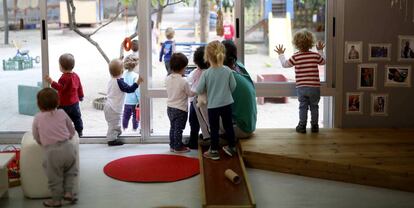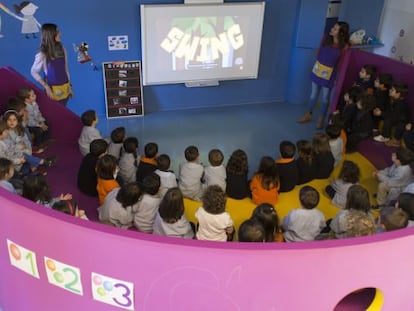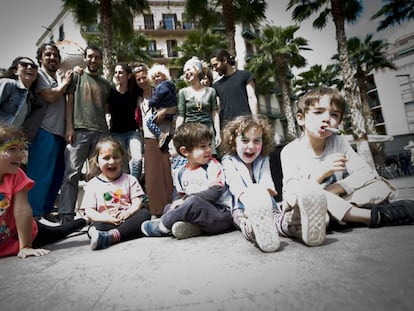Nurturing resilience in our children
Three Madrid therapists discuss strategies for preparing the next generation to deal with life
When I was small, my mother would put me in a large baby stroller, which she left at the bottom of the garden so she couldn’t hear my cries of protest. We lived on a farm on the east coast of Scotland, where the weather was what is known up there as dreich. But so long as there wasn’t a downpour, that’s where I would be parked for a couple of hours every day.

When I reached the age of five, my mother waved from the back door of our house as my sister and I joined the other farm children for the two-mile walk across the fields to school. The journeys were nothing short of an assault course. There was Flika, the Shetland pony with sharp teeth, Bruno the paranoid Labrador, and Willy and Ian, a couple of tinks who had lopped a dog’s head off with an ax and whose favorite sport was to run us into the nettle beds that grew along the sides of the path.
It was a tough childhood, a sort of 20th-century take on agōgē, the rigorous training regime for children popular with the Spartans that forced boys as young as seven to sleep on beds made from rushes pulled from the riverbank with the odd thistle thrown in during the winter months to help them stay warm.
Every time a child comes to see me, the first thing I do is to seek out their strengths Child psychotherapist Luis Arribas
We have come a long way since then – both from Ancient Greece and Scotland circa 1968. Strategically placed monitors mean our babies are never out of earshot. Our children’s moments of “boredom” are anxiously filled with a range of screens. We drive them hither and dither and when they’re hungry and thirsty, we order a pizza and crack open a can of Coke. And once we have them controlled with our various quick fixes, we settle down with our partners or friends to discuss if they spend too much time alone, go to the right school, have the right friends, talk enough, laugh enough, move enough or perhaps too much and so on.
This, in the words of Mercedes de Francisco, Lacanian psychoanalyst and author of Un Nuevo Amor (or, A new love) and En Femenino Singular (or, In the feminine singular), is “the age of constant surveillance.” Though nobody is suggesting we should return to beds of thistles or fraternizing with all and sundry, our tendency to provide our children with instant gratification is clearly not going to prepare them for the inevitable knocks and challenges we are trying so hard to protect them from.
“There’s a paradox,” says Mercedes de Francisco. “Children are being both ignored and watched too closely. The first signs of excitement or intense activity are labeled hyperactivity. But if you were being watched closely for hours and days on end, you would also become irritable and rebellious. Watch.”

She then sits and stares at me until I start to fidget to illustrate her point. “The label allows you to ignore the child. It’s a way of containing and controlling. What the child needs is appropriate attention – to be listened to properly. Children have all kinds of wonderful things to say. It is worth allowing them to be themselves without warping their development by labeling their every move.”
Slapping a label on someone is easy. “Job done!” we think with some satisfaction. It is, says De Francisco, the equivalent of locking a child in a cupboard.
Child psychotherapist Luis Arribas agrees. He takes issue with the new term, Generación Blandita – generation of softies – because all it does is to interfere with the search for healthy strategies to foster resilience. “Children are weak if we overprotect them, but if we don’t help them, they become hard and cold,” he says.
Children are being both ignored and watched too closely
Mercedes de Francisco, psychoanalyst
“Every time a child or an adolescent comes to see me, the first thing I do is to seek out their strengths. I find something they are good at and work from there. This is where true confidence can be nurtured. It’s a position of strength that allows them to visit the places they don’t otherwise dare to go.”
According to Arribas, family organization and habits are largely responsible for a child’s development. “There’s often a lack of attention to the child’s real underlying needs [which rarely have much to do with what they think they are],” he says. “It can be difficult to persuade families to come off their screens long enough to be aware of them. Parents should put emotions into words and then impose limits where they are needed.”
Instead of trips to McDonald’s or Media Markt, Arribas suggests playing board games as a family or going for a picnic in the countryside to boost confidence levels. Saving up to buy their own possessions such as bicycles or skateboards also empowers children.
“As long as we acknowledge their feelings, if we teach them from the outset that they can deal with waiting, they will learn that they can prevail,” says Claire Jasinski, a family therapist and teaching supervisor at Atenea, a therapy center in Madrid. “It’s important for children to learn that sometimes they will be thwarted, stymied, frustrated and challenged.”
Interestingly, Jasinski also stresses the importance of telling our children how we feel, removing the spotlight from them and shining it elsewhere. “It gives the child the opportunity to empathize and take care of others, and that gives them a feeling of power and usefulness in a world that doesn’t always cater to their needs, or those of their parents, siblings, teachers or friends,” she says.
Tu suscripción se está usando en otro dispositivo
¿Quieres añadir otro usuario a tu suscripción?
Si continúas leyendo en este dispositivo, no se podrá leer en el otro.
FlechaTu suscripción se está usando en otro dispositivo y solo puedes acceder a EL PAÍS desde un dispositivo a la vez.
Si quieres compartir tu cuenta, cambia tu suscripción a la modalidad Premium, así podrás añadir otro usuario. Cada uno accederá con su propia cuenta de email, lo que os permitirá personalizar vuestra experiencia en EL PAÍS.
En el caso de no saber quién está usando tu cuenta, te recomendamos cambiar tu contraseña aquí.
Si decides continuar compartiendo tu cuenta, este mensaje se mostrará en tu dispositivo y en el de la otra persona que está usando tu cuenta de forma indefinida, afectando a tu experiencia de lectura. Puedes consultar aquí los términos y condiciones de la suscripción digital.









































